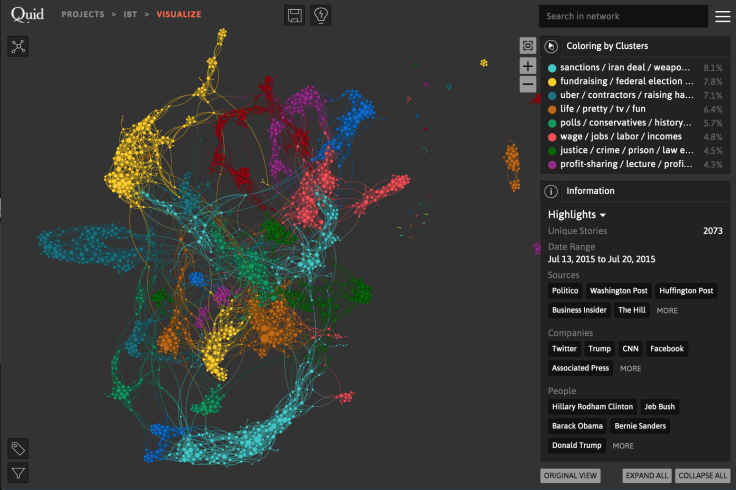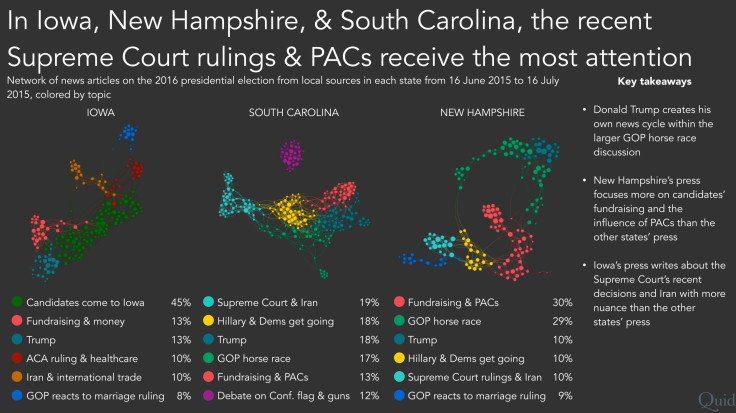Meet Quid, The Silicon Valley Big Data Analytics Startup That Hopes To Shake Up The 2016 Presidential Race

SAN FRANCISCO -- Massachusetts Democrat Seth Moulton used a number of tried-and-true campaign strategies on his way to defeating 18-year incumbent John F. Tierney in last September's congressional primary, such as polling, focus groups and TV ads. But he also tried something new: technology from a 5-year-old San Francisco data analytics startup called Quid.
The technology allowed Moulton's campaign staff to see what was being said about the candidate on news sites, social media and blogs. Basically, it was a real-time gauge of how the campaign's messages were being received -- the kind of information that candidates used to collect by conducting polls. The Moulton campaign used the information to identify articles they could promote on Facebook and get in front of more Massachussetts voters.
“We as a congressional campaign didn't have the budget to do a daily tracking poll, so when we were getting daily or weekly updates from Quid -- showing what people in our district were seeing in the papers and what the sentiment of those articles was and what they were seeing on social media -- that was very valuable for us,” said Aaron Bartnick, a senior member of Rep. Moulton's 2014 campaign.
Over the past five years, Quid has raised more than $66 million in funding and developed its analytics software, which takes millions of documents of data and turns them into simple-to-digest graphs and topical maps that are designed to help its users identify connections and trends. Quid developed the technology for business, but before last year's midterm elections it started marketing the service to political campaigns as a way to get a leg up on opponents.
Poll Position
Now, with the 2016 campaign well underway, Quid has also begun to attract attention from national campaign strategists. The catch: Quid costs $25,000 a year, or about the cost of a Bloomberg terminal. A quality poll costs anywhere from $20,000 to $40,000. “Any software like Quid that can help consultants analyze strings of data and help them do their jobs more efficiently and effectively would be welcomed in open arms by a campaign,” said Craig Agranoff, founder of PoliticalConsulting.com and co-founder of Gripd.com, a digital marketing agency. “A lot of times you’re not finding voters because you’re asking the wrong people and the wrong questions."

Quid can identify who the top influencers are for every topic, how often the media writes about a topic and how often the public shares those stories. In the chart above, for example, Quid shows there is a wide range of topics being discussed when it comes to Democratic candidate Hillary Clinton, with the most popular topics related to the Iran nuclear deal, her fundraising and her recent comments involving the so-called "gig economy" and how they affect ride-hailing service Uber.
"A lot of social monitoring tools can tell you tweets are up on ‘Hillary Clinton’ and ‘Trust’ but they don't tell you anything else,” said David Katz, Quid sales director. “We can tell you that, for example, this subset wants to vote for a Democrat, they want to trust Hillary Clinton, but they need to hear from her about trust. Quid provides context around the keywords, not just their frequency.”
Quid is not yet a replacement for a poll. It can’t narrow its results to likely voters as a quality poll can. But for candidates who can’t afford to pay for a poll every week, paying for a Quid subscription is an alternative. For candidates who can pay for polls, Quid can essentially serve up real-time focus groups and show what people are talking about and how they feel about those topics.
“Nate Silver exposed that there are newer, better ways to do polling and to guide your strategy as a politician,” said Mike Harden, senior partner at Artis Ventures and an investor in the company, referring to the statistician who analyzes election data. “Quid is going to let everybody be a Nate Silver.”
How Clinton Helped A Republican
The data contains surprises. In November, Quid released an analysis showing that Hillary Clinton may have caused the downfall of a fellow Democrat. In Iowa, Democrat Bruce Braley was in the lead to take over the seat of retiring Sen. Tom Harkin -- until a September visit by Clinton in which she talked extensively about women’s issues. Clinton’s influence appears instead to have helped Braley's challenger, Republican Joni Ernst, as she immediately shot ahead of Braley in the polls and was elected in November.
These kinds of insights can be revealed in polls, but sometimes not fast enough to matter. "The type of insights you might get in a poll that usually takes six to eight weeks, we can do within 30 minutes to an hour,” Katz said. “By quickly understanding what people are saying in blogs, Twitter, and in the news, we can arrive at the same kind of insights faster -- saving users both time and money."

© Copyright IBTimes 2024. All rights reserved.






















